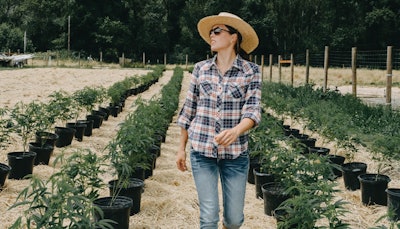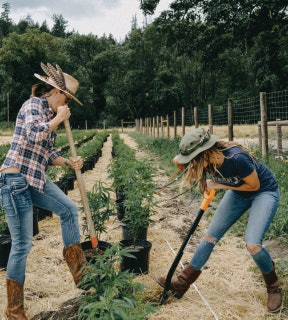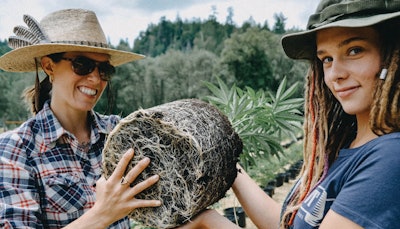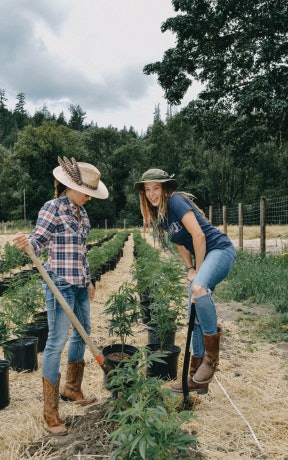
The “Emerald Triangle,” an area in northern California comprising Humboldt, Mendocino and Trinity Counties, has a reputation as the mecca of cannabis cultivation for its highly fertile soil, ideal climate and the scores of cannabis farming experts who have made the region their home.

Siobahn and Adram Darwish, owners of Blessed Coast Farms, are such experts, with second-generation experience growing cannabis.
I first met Siobhan and Adram at the Marijuana Business Conference in Washington, D.C. Siobhan, who has 15 years of cultivation experience, spoke with pride in being the first licensed farm in Humboldt County. She was relaxed, but had an edge about her that let everyone know she meant business: a true “Humboldt chick,” as another cultivator later referred to her.
Adram spoke about how he stepped away from the day-to-day of the farm to focus on the couple’s other business: Darwish Building and Consulting. That company helps other cannabis farmers in the Emerald Triangle get their businesses up to regulatory standards and assists them in the municipal licensing process.
“We are forever grateful to our community and state that we have this opportunity for our small family farms to be able to grow legally,” they said after the show.
Here, Siobhan discusses details about their organic farm, the licensing process in Humboldt County and provides perspectives on the future of the Emerald Triangle.
Brian MacIver: What can you tell me about your farm?
Siobhan Darwish: Our farm is licensed for 10,000 square feet of mixed-lighting cultivation and associated processing. We have two additional farms that are in their last stages of permit approval. One, also mixed lighting, is under construction ... and will feature approximately 200 lights and will be a fully perpetual production model. The last farm is off-grid and is natural-lighting only.
Blessed Coast Farms is full-sun and organically grown. The majority of the farm hands here are female, and we are proud to produce high-quality, clean medicine. … We do not use synthetic fertilizers or pesticides. We track water usage closely and utilize efficiency measures. When possible, we practice permaculture principles, and use local resources as often as we can. We believe that sustainability extends to setting a high standard for conduct, and we are working to educate the community that the emerging legal cannabis industry is contributing to society, not taking from it.
BM: You were the first grower in Humboldt with a local permit (awarded in June 2016). How was the licensing process there?
SD: The licensing process here in Humboldt County is based on land usage. We had been watching the ordinance drafts and worked hard to be in the right place at the right time when the final draft finally passed. Because we are a ‘new’ farm, meaning that cannabis had not been cultivated here before, we didn’t have any legacy infrastructure that needed to be improved before permitting. It’s a challenging process for many farmers to suddenly bring their infrastructure, farms and operations plans into compliance.

BM: How has being licensed affected how you do business?
SD: Being licensed affects every single decision that we have to make as a business. We have to plan and document everything, and make sure that we are not stepping out of bounds for any of the regulations or agencies involved. … With regard to our cultivation operations, we document water usage and rates, fertilizer applications, pest controls, etc. We try to include as much data into our garden journals as possible so that we will have a record later for things that we may not have thought would be important.
BM: What led to your decision to team up with your sister on your business?
SD: I have been living and growing in Humboldt County for 15 years and have since gained a great amount of knowledge on the topic of cultivating cannabis. Once our farm … became permitted, we needed help. Who better to help than your family? I called my little sister, Sloan Reed, and invited her and her partner out here from Utah to work on our farm. Sloan had no prior knowledge of farming, the culture in Humboldt or the cannabis industry.
BM: Many growers try to keep their growing methods secret, but you and your sister launched an educational YouTube channel called Grow Sisters to teach people how you cultivate. Why was that important to you?
SD: Grow Sisters came to life once Sloan and I realized how unique our story was. The opportunity to document our journey together was too golden to pass up. As Sloan learns how to farm, we will share our experiences with our viewers with the hope of helping to educate them in the world of growing cannabis. We aim to share knowledge and spread love.
For far too long, the farmers who believe in cannabis as a medicinal herb have been looked down upon in our society. We are honored to share our story with the world in hopes of shedding a positive light on the subject. Grow Sisters is designed to share knowledge, highlight women in the industry of agriculture, and express that there are many different ways to grow your own medicinal cannabis. Many lives, many different paths, because you can grow your own way.
BM: What are your plans for “Grow Sisters” this year?
SD: We plan on filming our 2017 Grow Season with instructional videos that we will be posting on our YouTube channel [bit.ly/grow-sisters-videos].

This project is important to us because sharing knowledge and educating people to grow their own promotes keeping cannabis in the hands of the farmers and not large corporations. Farming must be shared from generation to generation, or we all will perish.
BM: Many growers in Humboldt, Mendocino and Trinity counties were opposed to MCRSA and Proposition 64. Do you know of any other growers who have applied for the local license?
SD: There were nearly 2,500 applications submitted in Humboldt County for commercial cultivation. As of recently, of those 2,500, maybe 150 were complete applications. More applications will be completed as farmers are able to complete infrastructure improvements and engineering requirements. It’s difficult for many of these applicants to move forward because all the ancillary services, like engineering and surveying, were suddenly overwhelmed with demand. Many fly-by-night service providers are trying to fill the voids, and some farmers are paying a lot for very little progress.
BM: How are you preparing for the launch of the recreational market?

SD: We are sitting on the edge of our seats to see how California implements the recreational market. We have yet to see state-licensing details, but are preemptively preparing the documents and plans that we are anticipating will be required.
There are some conflicting laws in California about water sources and storage that puts many farmers between a rock and a hard place. We know that the state is working on legislation to solve this, but for those of us out in the fields, we have to have a solid solution now in order to be in full compliance.
BM: What has been your biggest challenge as a cannabis cultivator?
SD: Our biggest challenge in the past has been that organic cannabis sells at the same price as non-organic. Growing organic is much harder than growing conventional. We believe with the farm-to-table movement gaining momentum that consumers will become more aware of their medication and seek out organic.
These cultivation practices are what set us apart from other growers. We are blessed to be able to plant directly into the earth from Humboldt County native-grown soil. We pride ourselves on being a sustainable farm. Everyone who works here lives on-site; we reuse all plastics, recycling what we cannot. We make compost teas over buying chemical fertilizers in plastic bottles, and cultivate organically.
BM: What do you think the future holds for the Emerald Triangle?
SD: It’s a wide spectrum. Some people are going to do great, others are already struggling. Most are somewhere in the middle. As a whole, Humboldt County, Mendocino County and Trinity County hold the most experienced cannabis cultivators in the United States. The Emerald Triangle will thrive with its perfect growing climates and knowledgeable cultivators.















